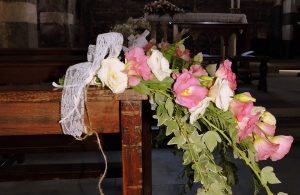One of the sacraments of the church is joining two people in holy matrimony. This has always been a favored ritual for parishioners as well as church officiators. Families, friends and religious officials are gathered to help celebrate a couple beginning their life together. For the couple, it was the beginning of their new life together. Family and church officials saw it as continuity of the church's family. Over the centuries, very little has been allowed to change in this celebratory ritual. Modern times have brought a few updates.
Wedding vows have always been a solemn affair that was dictated by the church. A wedding mass is still part of most ceremonies, but it is now in the local language rather than Latin. Couples finally won the ability to speak their own words within the ceremony, but this has only been in recent decades. The basic outline of the ceremony itself still remains the same.
The music provided by the church has its own history. Instrumental musicians and choirs were often a staple at larger churches, and the church commissioned and approved all of the music played. Until recently, churches had a list of musical pieces that were allowed, and anything not written by a church member was banned. This included The Wedding March because the writer was of a different faith. Fortunately, times have changed and churches no longer restrict most musical choices.
Historically, many churches have used the organ as their main musical instrument. Not all modern couples want organ music for their ceremony. They may prefer the smooth sounds of a wedding saxophonist. More traditional couples will trade the church's organ for a wedding violinist. Some even prefer to hire a guitarist as that has become more acceptable in recent decades. No matter the changing music or words, weddings still provide a sense of continuity to members of the church.
















